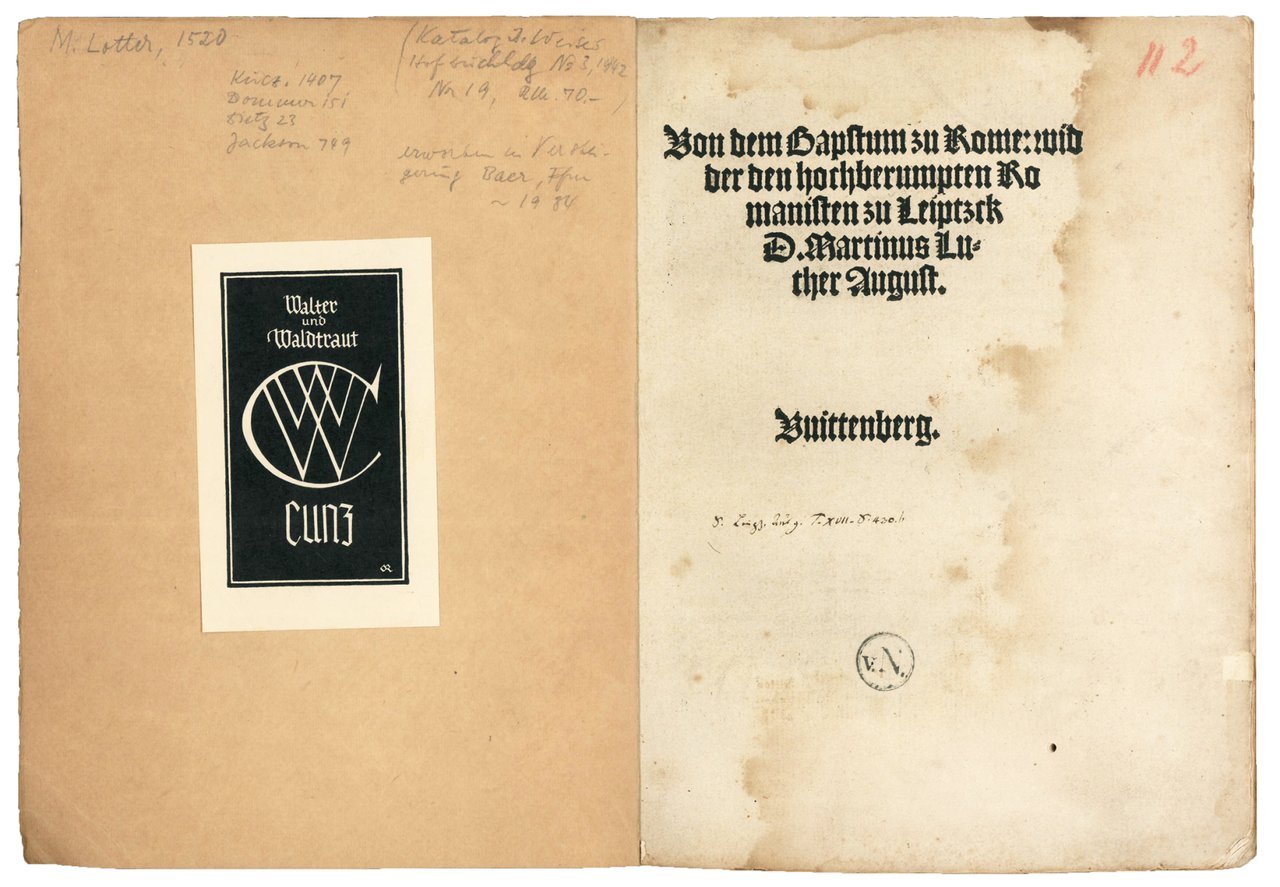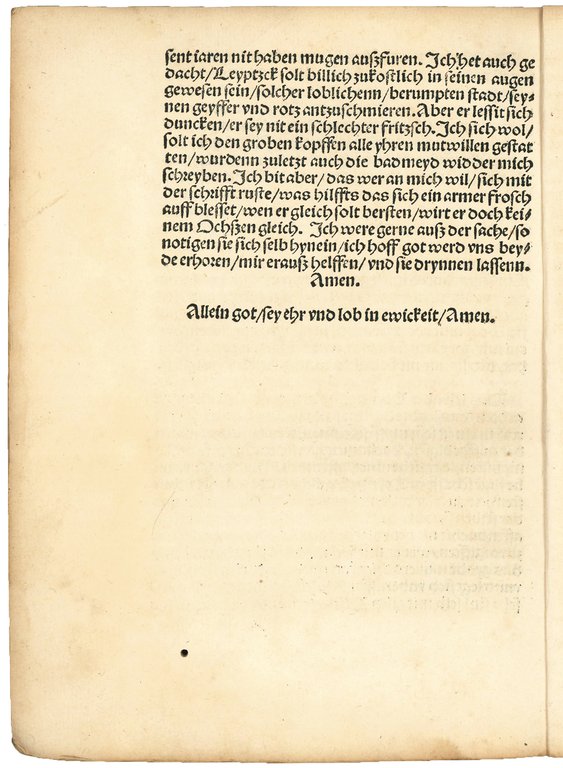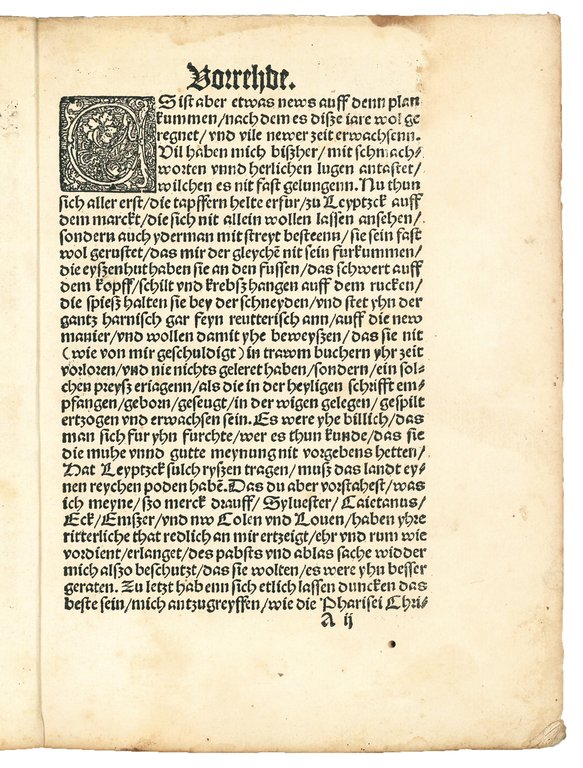


Rare and modern books
LUTHER, Martin (1483-1546)
Von dem Bapstum zu Rome: widder den hochberumpten Romanisten zu Leiptzck D.Martinus Luther August. Vuittenberg
[Melchior Lotter d.J.], [1520]
2200.00 €
Govi Libreria Antiquaria
(Modena, Italy)
The correct shipping costs are calculated once the shipping address is entered during order creation. One or more delivery methods are available at the Seller's own discretion: Standard, Express, Economy, In-store pick-up.
Bookshop shipping conditions:
For items priced over €300, it is possible to request an instalment plan from Maremagnum. Payment can be made with Carta del Docente, Carta della cultura giovani e del merito, Public Administration.
Delivery time is estimated according to the shipping time of the bookshop and the courier. In case of customs detention, delivery delays may occur. Any customs duties are charged to the recipient.
For more infoPayment methods
- PayPal
- Credit card
- Bank transfer
-
-
Find out how to use
your Carta del Docente -
Find out how to use
your Carta della cultura giovani e del merito
Details
Description
First edition (it was reprinted eleven times in the year 1520) of this important pamphlet, in which Luther fiercely responded to the work on papal primacy of the Leipzig theologian Augustin von Alveldt (1485-1530).
While Luther was defending himself against the attacks from the theological faculties of Leuven and Cologne, a new opponent emerged in Leipzig: the Franciscan monk Augustin of Alveldt (or Alfeld), who defended the divine right of the papal monarchy. Alveldt wrote a Latin treatise entitled Super apostolica sede (‘On the Apostolic See', Leipzig, 1520), which appeared in early May and in which he solemnly stated that anyone who did not recognize the successor of Peter as Christ's representative was a heretic. Luther, who was then working on his sermon on good works, deemed Alveldt's work and attack on him unworthy of his time. However, when Alveld also published his work in German (Eyn gar fruchtbar vnd nutzbarlich Buchleyn von dem babstlichen Stule und von Sant Peter, Leipzig, 1520), Luther felt compelled to reply, also in German, with the pamphlet Von dem Papsttum zu Rom wider den hochberühmten Romanisten zu Leipzig (‘On the Papacy Against the Highly Renowned Romanist in Leipzig'), which he quickly wrote in May and had printed in June. In it, Luther states that he took this opportunity to “explain something about Christianity” to the laity.
In fact, Luther also addresses in the script the question raised in particular by the Leipzig Disputation, providing an explanation of ‘Christianity' or the nature of the Christian church in general. His dispute with Alveldt thus represents one of his most significant teachings from that period. Alveldt had drawn conclusions from the analogy of earthly communities. Luther counters this by explaining that, according to the language of Scripture, Christianity is rather a non-physical gathering of hearts in faith, love and hope. This spiritual, inner Christianity is the church in the truest sense of the word. He concedes, however, that there is also a physical, external Christianity organised into parishes, dioceses and the papacy. The latter should not be separated from the former, but participation in it does not make one a true Christian. True Christianity is not bound to a specific constitution or form as the kingdom of God is wherever faith exists. However, something external also belongs to the true church: indeed not Rome or the papal authority, but certainly baptism, the sacrament of the body of Christ, and the Gospel. These are the signs by which one can recognise the true church in the world. The true church, as a community of saints united in faith, is therefore not visible, but can only be recognised by faith. In this sense, Luther does not teach an invisible church - a mere idea or empty construct - but a living embodiment of real personalities united in spirit and extending far beyond Roman boundaries. For Luther, the assumption that the church must or could have a physical head is invalid from the outset. The spiritual community can only have Christ in heaven as its head, not a human being. Luther also rejects Alveldt's argument that every earthly community must have a physically united head. For Luther, the Roman Empire, which governed itself perfectly well for a long time without such a head, and the Swiss Confederation in more recent times, are counterexamples. After all, all of humanity descends as one race from Adam, yet is not under one secular sovereign; each nation has its own particular government. Furthermore, at the beginning of his response, he dismisses Alveldt's

